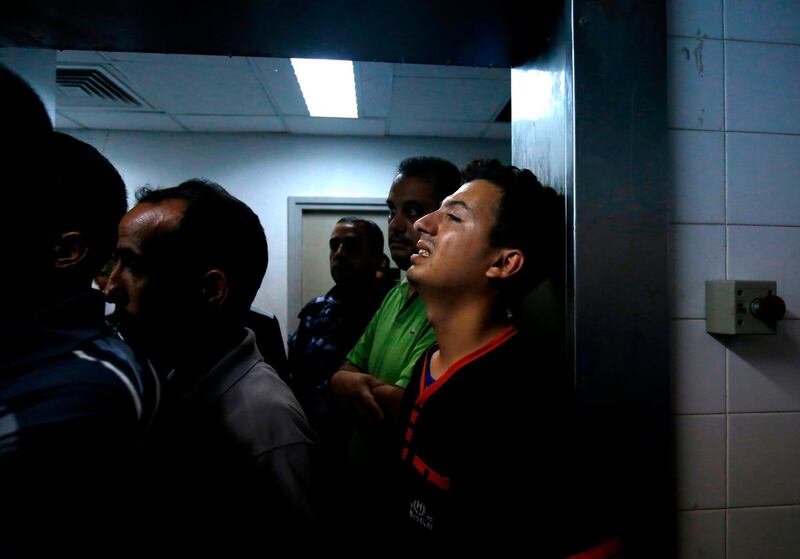Israel will reopen Gaza’s main commercial crossing on Tuesday if a tense truce continues to hold, the government said on Sunday.
The announcement came after the UN warned that at least one Gaza hospital had closed because of fuel shortages after Israel tightened imports into the enclave.
Israel closed the Kerem Shalom crossing on July 9 in a bid to stop Palestinians flying kites and balloons that have started fires across the border in southern Israeli territory. On July 17, it further tightened the restrictions to also prevent fuel deliveries while reducing the fishing zone Israel enforces off Gaza to three nautical miles from six.
But the UN warned on Sunday that supplies of emergency fuel were fast running out and that donor funding could be used up by August.
UN Humanitarian Co-ordinator in Palestine Jamie McGoldrick said at least one hospital has been forced to shut down since the border crossing closure.
“Services are being dramatically reduced at others,” Mr McGoldrick said in a statement. “Given ongoing blackouts of about 20 hours a day, if fuel does not come in immediately, people’s lives will be at stake with the most vulnerable patients, like cardiac patients, those on dialysis and newborns in intensive care, at highest risk.”
Tensions have risen on the border in recent days after a Palestinian sniper killed an Israeli soldier, leading to an intense Israeli military barrage on the enclave. The bombardment led to a truce between Gaza’s rulers Hamas and Israel on Saturday.
Palestinians have continued to fly kites and balloons attached with flaming rags across the border, starting fires that have cost Israel millions of dollars. Israeli ministers have called for a harsh response to the devices that the military has largely been unable to intercept.
But the young Palestinian men launching the low-cost devices said they were doing so to protest against Israel’s crippling siege of the enclave since 2007. The Israeli military has killed at least 149 Palestinians who have taken part in weekly protests since March 30, and its snipers have wounded thousands, many who have suffered life-changing injuries.
________________
Read more
Israel seizes boat from Gaza seeking to break blockade
Gaza truce mostly holds after heavy Israel strikes
________________
The closure of the border crossing has brought an enclave already reeling from the siege even closer to the brink of disaster.
"Al Quds hospital which provides life-saving interventions for 150,000 people a year will be forced to shut down in the coming days because of a lack of fuel," Chris Gunness, spokesman of UNRWA, the UN body that helps Palestinian refugees, told The National by phone.
He said that another four hospitals might close down because they were likely to run out of fuel in the next few days.
“It looks unprecedentedly bad,” he said. “Over a million people are going to be directly affected by the closure of hospitals.”
The UN has condemned the rockets fired from Gaza as well as the kites and balloons flown across the border into Israel, but it called on the country to reopen the border crossing immediately and allow fuel imports to prevent the collapse of vital medical facilities.
“Israel says there is an existential threat. Obviously [the kites] must stop. But let’s be realistic about who faces an existential threat if you look at the figures,” Mr Gunness said, citing figures of more than 4,000 Gazans taken to hospital because of live fire.
“Israel needs to lift these restrictions on fuel and the long-term blockade needs to end,” he said. “It’s collective punishment and a violation of international law.”
Israel said it would only open the crossing if calm was maintained along the border.
Israeli Defence Minister Avigdor Lieberman said that “if today and tomorrow the situation continues as it was yesterday, then on Tuesday we will allow Kerem Shalom [goods crossing] to return to normal activity and the fishing zones will return to the same distances as before”.
Mr Lieberman, speaking at the crossing, stressed that calm also meant an end to months of kites and balloons carrying firebombs over the border fence from the Palestinian enclave run by Islamist movement Hamas to burn Israeli farmland.
Israeli authorities say hundreds of fires have been started by the firebombs since April.
Mr Lieberman said: “The key is quiet, calm, zero firebombs, zero friction on the fence and zero rockets or, God forbid, shooting."





